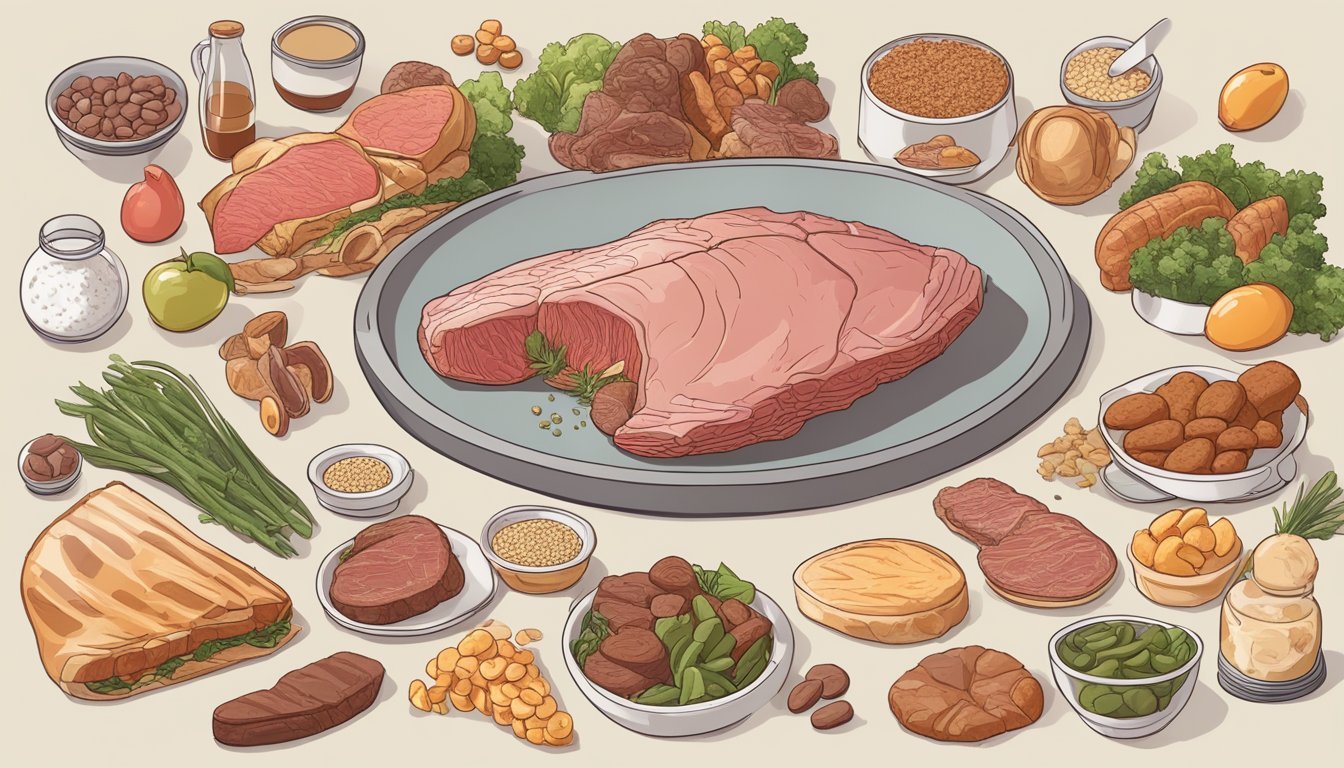Carnivore Diet and Pancreatic Function
Exploring Health Impacts
The carnivore diet, characterized by an exclusive consumption of meat and other animal-based foods, has been subject to both scientific curiosity and health debates. Embracing a high intake of protein and fat, this dietary approach eliminates carbohydrate-rich plant foods entirely, focusing solely on nutrients derived from animal sources. Proponents suggest that by consuming meats, offal, dairy, and eggs, a carnivore diet may potentially support various aspects of health by providing essential nutrients, although this assertion remains contentious in the nutritional community.
Examining the impact of a carnivore diet on pancreatic function is particularly intriguing. The pancreas plays a pivotal role in digestion and metabolism, secreting enzymes that break down proteins and fats, as well as hormones that regulate blood sugar levels. While a diet high in animal protein requires the pancreas to produce ample digestive enzymes, there is an ongoing discussion about how such a diet might influence pancreatic health and function over time.
Critics argue that the absence of certain plant-derived nutrients and the potential overload of protein could pose health issues, including stressing the pancreas. Yet, the lack of comprehensive studies on the carnivore diet's impacts means conclusions are not definitive. As interest grows in understanding how diet influences health, the effects of a carnivorous dietary pattern on the pancreas remain an area ripe for investigation.
Carnivore Diet Overview
This section covers the origins, defining characteristics, and main components of the carnivore diet, emphasizing its singular focus on animal-derived food sources.
Origins and Evolution
The carnivore diet, while recently growing in popularity, is not a contemporary invention. It hearkens back to an ancestral way of eating, focusing on high-fat and high-protein animal products predominant in the diets of early humans. Its resurgence taps into the belief that human physiology may be better adapted to this historic pattern of consumption.
Defining the Carnivore Diet
The carnivore diet is characterized by its exclusion of plant-based foods, with practitioners consuming only animal products. The rationale behind the diet is grounded in the idea that human digestion and metabolism may be optimized by a regimen derived exclusively from animal sources, eliminating carbohydrates, fiber, and plant-based nutrients.
Main Components
The primary elements of the carnivore diet consist of:
Meat: All types of muscle meat form the foundation of the diet.
Fish: Included for its protein content and omega-3 fatty acids.
Eggs: A consistent source of protein and nutrients.
Dairy: High-fat dairy products are consumed by some, while others may exclude dairy due to lactose content.
Fat: Integral to the diet, coming from both the trimmings of meat and selected dairy.
A typical macronutrient distribution heavily favors protein and fat, with virtually no carbohydrates. The diet advocates for prioritizing fattier cuts of meat and the inclusion of organ meats to ensure nutritional adequacy.
Impact on Pancreatic Function
The impact of a carnivore diet on pancreatic function can be assessed by examining three main areas: enzyme production, health indicators, and disease associations. These factors are critical in understanding how such a diet influences the pancreas.
Digestive Enzyme Production
The pancreas secretes digestive enzymes that play a crucial role in breaking down proteins, fats, and carbohydrates. A carnivore diet, consisting primarily of animal products, may influence pancreatic function due to high protein and fat content. This diet can lead to increased demand for proteases and lipases, enzymes responsible for protein and fat digestion, respectively.
Pancreatic Health Indicators
Indicators of pancreatic health include nutrient absorption and the absence of digestive issues. The nutrient profile of a carnivore diet is distinct, as it typically lacks certain vitamins and fibers found in plant-based foods, which can affect overall digestive health. For instance, adequate fiber intake is correlated with a reduced risk of pancreatic diseases. This dietary pattern may impact the indicators of pancreatic health, necessitating careful monitoring.
Association with Pancreatic Diseases
Studies suggest relationships between diet and the risk of pancreatic diseases. The absence of certain food groups in a carnivore diet, such as fruits and vegetables rich in vitamins and fiber, has been associated with implications for pancreatic health. While some dietary patterns show an inverse relation to pancreatic cancer risk, notably those high in fruits and vegetables, it raises considerations regarding the long-term effects of a carnivore diet on pancreatic disease risks.
Nutritional Considerations
A carnivore diet, focused on the consumption of animal products, brings unique nutritional challenges, particularly affecting macronutrient balance and micronutrient intake.
Macronutrient Balance
The carnivore diet is rich in protein and fat, including saturated fat, due to its reliance on animal products. These macronutrients are essential for many bodily functions, including muscle maintenance and hormone synthesis. However, one should monitor the type and quantity of fats, considering the balance between saturated and unsaturated fats to maintain optimal cardiac health.
Vitamin and Mineral Intake
Animal products are generally high in certain vitamins and minerals, such as B12, iron, and zinc. However, the absence of plant-based foods means a potential lack of variety in nutrient sources. Incorporating a range of animal-based food sources — such as organ meats and seafood — can help ensure a broader spectrum of nutrients.
Potential Deficiencies
A meat-only diet may lead to deficiencies in nutrients typically found in plant foods. These can include:
Vitamin C: Scurvy can occur if intake is insufficient, although some organ meats can provide this vitamin.
Fiber: Essential for digestive health, fiber is absent in animal products, potentially leading to gastrointestinal issues.
Other Vitamins and Minerals: A deficiency in vitamins E, K, and folate, as well as minerals like magnesium and calcium, may develop without supplementation or careful dietary planning.
Common Health Effects
The Carnivore Diet, focusing purely on animal products, has various health implications. This section reviews how such a diet may affect weight management, blood sugar levels, cardiovascular health, and the immune system's response to inflammation and autoimmune conditions.
Weight Management
Individuals may experience weight loss on the Carnivore Diet due to reduced carbohydrate intake and an increased protein consumption, which can promote satiety and reduce overall calorie intake. However, obesity management should be approached cautiously, as the long-term effects of this diet on weight control are not well-documented.
Blood Sugar and Diabetes
The reduction of carbohydrate consumption on the Carnivore Diet can lead to lower blood sugar levels. This might be beneficial for managing type 2 diabetes, but patients should manage this under medical supervision to avoid hypoglycemia or other metabolic disturbances.
Heart and Artery Health
The high intake of saturated fats and cholesterol with the Carnivore Diet can raise concerns regarding heart disease. Elevated cholesterol levels might contribute to the development of atherosclerosis, potentially affecting artery health. Individuals should monitor their heart health through regular checkups.
Inflammation and Autoimmune Response
Anecdotal reports suggest that the Carnivore Diet may reduce systemic inflammation and improve symptoms in some autoimmune conditions. This might be due to the elimination of certain plant-based foods that could act as irritants or triggers for some individuals. More scientific research is needed to substantiate these claims.
Gastrointestinal Impact
The Carnivore Diet, with its exclusion of plant-based foods, significantly influences gastrointestinal function through changes in gut microbiota, fiber intake, and potential risks to colorectal health.
Effect on Gut Microbiota
The Carnivore Diet drastically reduces microbial diversity in the gut since it eliminates carbohydrates and fibers that fuel a wide array of beneficial microbes. A fiber-free diet leads to a monotonous microbiome, potentially diminishing the gut's resilience and its ability to protect against pathogens.
Constipation and Fiber Intake
Consuming no plant-based foods means ingesting minimal to no dietary fiber, which is crucial for bowel regularity. Consequently, individuals on the Carnivore Diet often experience constipation, as fiber helps to form stool and promote peristalsis, the movement of the digestive tract that propels waste.
Risks of Colorectal Disorders
The absence of fiber also seems to correlate with an increased risk of developing diverticulosis and potentially other colorectal disorders like colon cancer. Adequate fiber intake is widely recognized for its role in reducing such risks by enhancing stool bulk and speeding up transit time through the colon.
Psychological Aspects
The link between diet and psychological well-being is an area of considerable interest, particularly with the rising popularity of the carnivore diet. The following subsections will explore the associations between a meat-focused dietary pattern and mental health, including effects on depression and anxiety, as well as the diet's influence on satiety and the management of food cravings.
Diet and Mental Health
The carnivore diet, which primarily consists of meats, eggs, and certain dairy while excluding plant-based foods, has been a subject of scrutiny regarding its impacts on mental health. Studies and anecdotal evidence suggest that individuals on this diet may report improvements in mood and a reduction in symptoms related to depression and anxiety. The specific mechanisms are not fully understood, but proposed explanations include stable blood sugar levels due to low carbohydrate intake and the influence of high-protein diets on neurotransmitter synthesis.
Satiety and Food Cravings
The carnivore diet, rich in proteins and fats, is known to boost satiety, the feeling of fullness post-meal, which may contribute to a reduction in food cravings. Proteins have a high satiety index and could lead to less frequent hunger cues. This inherent characteristic of the carnivore diet suggests potential benefits for those striving to manage cravings, especially for sugars and refined carbohydrates, substances often linked with fluctuations in mood and energy levels.
Debates and Criticisms
The carnivore diet, involving exclusive consumption of animal products, faces significant scientific and medical scrutiny, with critics raising questions about its nutritional completeness. Anecdotal evidence suggests health benefits, but these claims are met with skepticism by the larger medical community.
Scientific and Medical Scrutiny
Shawn Baker, a well-known proponent of the carnivore diet, has had his medical license revoked by the New Mexico Medical Board due to concerns about its safety and efficacy. Critics point to a lack of rigorous scientific evidence supporting the diet, particularly with regard to pancreatic function and the potential risk of pancreatic diseases. The diet's restriction of dietary fibers and certain vitamins that are typically found in plant-based foods could, in theory, impact digestive health and long-term pancreatic function.
Key concerns include:
Potential nutrient deficiencies
Long-term impacts on health
Lack of peer-reviewed scientific studies
Popular Assertions and Anecdotal Evidence
While empirical, peer-reviewed research on the carnivore diet is scarce, anecdotal assertions by individuals such as Dr. Jordan Peterson and his daughter, Mikhaila Peterson, claim significant health improvements. These personal testimonials often highlight remission of autoimmune issues and enhanced mental clarity. However, such individual reports, while compelling, lack the scientific rigor necessary to validate the diet's safety and effectiveness. The diet's controversial nature is further fueled by these powerful personal stories, contrasting sharply with the cautious, evidence-based assessments of the medical community.
Common anecdotal claims include:
Improved overall well-being
Resolution of chronic health conditions
Enhanced cognitive functions
Comparative Diets
In considering the impact of various diets on pancreatic function, two popular diets are often compared to the carnivore diet: the ketogenic diet and the omnivorous dietary pattern. While they differ in macronutrient composition and food variety, both have unique implications for pancreatic health.
Ketogenic Diet Similarities
The ketogenic diet, like the carnivore diet, places an emphasis on high-fat intake and reduces carbohydrate consumption to a minimum. This approach often includes the following foods:
Vegetables: Low-carb varieties such as leafy greens
Nuts: High-fat options, such as macadamias and almonds
Fruits: Primarily berries in moderation
Fats: Oils and butter for cooking and flavor
One specific similarity between the ketogenic and carnivore diets is the metabolic state of ketosis, where the body burns fat for fuel in the absence of carbohydrates. This state may have various effects on pancreatic enzyme production and insulin regulation.
Omnivorous Dietary Patterns
An omnivorous dietary pattern typically includes a broader range of foods:
Grains: Such as wheat, rice, and corn
Legumes: Including beans, lentils, and peas
Fruits and Vegetables: A colorful array for micronutrients
Meats and Animal Products: In moderation for protein and fat
Omnivorous diets are defined by their balance and variety, potentially providing a breadth of nutrients beneficial for pancreatic function. This dietary pattern also allows for the inclusion of fibrous foods like grains and legumes, which can be supportive of healthy digestive processes.
Special Considerations
When adopting a carnivore diet, individuals must consider their unique nutritional requirements and health conditions. Each subgroup such as athletes, pregnant or lactating women, and individuals with specific health conditions may require different dietary adjustments for optimal health outcomes.
For Athletes and High-Activity Individuals
Athletes and individuals with high activity levels have increased energy and protein demands to support muscle repair and overall energy expenditure. A carnivore diet, rich in protein, can support muscle synthesis and recovery. However, they need to ensure adequate intake to meet higher energy requirements, which might typically be supplemented by carbohydrates in a more varied diet.
Energy Requirements: Monitor caloric intake to ensure it meets elevated demands.
Protein: Prioritize a variety of animal-based protein sources to maintain muscle mass and function.
For Pregnant or Lactating Women
For pregnant or lactating women, nutrient needs are significantly higher to support the growth and development of the fetus and the nutritional composition of breast milk. While a carnivore diet is protein-rich, it may lack certain nutrients essential during pregnancy, such as folate, which is abundant in leafy greens.
Nutrient Intake: Emphasize the importance of a nutrient-rich diet that may require supplementation.
Protein: Ensure protein intake is sufficient but also balanced with other critical nutrients.
For Individuals with Specific Health Conditions
Individuals with certain health issues, such as arthritis, may find a carnivore diet beneficial due to its potential anti-inflammatory properties. However, the absence of plant-based foods could lead to deficits in fiber and certain vitamins, which play a role in overall health maintenance and disease prevention.
Arthritis: Consider the potential benefits of a high-protein, low-carbohydrate diet on inflammation.
Health Issues: Closely monitor and possibly adjust the diet in consultation with healthcare providers to address specific nutritional needs or deficiencies.
Sustainable Practices and Ethical Concerns
In discussing the carnivore diet, one cannot ignore the sustainable practices and ethical concerns tied to it. The environmental impact of meat production and the welfare of animals are pivotal aspects of these discussions.
Environmental Impact
The carnivore diet, which is solely based on animal products, places significant demand on meat production. Sustainable farming techniques aim to mitigate environmental consequences such as greenhouse gas emissions, land degradation, and overuse of freshwater resources that are commonly associated with conventional meat production. For example, practices like regenerative agriculture can improve soil health and sequester carbon, but they must be implemented widely to offset the impacts of a meat-centric diet.
Greenhouse Gas Emissions: Livestock farming contributes to CO2, methane, and nitrous oxide emissions.
Land Use: Large tracts of land are required for cattle grazing, often leading to deforestation.
Water Use: Animal husbandry is water-intensive, with large volumes needed for animal sustenance and crop production to feed livestock.
Animal Welfare
Animal welfare is a critical ethical concern within the context of a carnivore diet. Ethical considerations involve ensuring the humane treatment of animals throughout their life cycle, from rearing to slaughter. There are ongoing debates on the necessity and morality of consuming a diet exclusively based on animal products, considering the welfare implications for the animals involved.
Living Conditions: Animals should be provided with adequate space, appropriate nutrition, and care to prevent suffering.
Slaughter Practices: The process of slaughtering animals is under scrutiny to ensure it is executed with minimal pain and distress.
Discussions on the carnivore diet intersect at the crossroads of human health, environmental sustainability, and ethical treatment of animals. Sustainable practices in meat production and a focus on animal welfare are crucial in addressing the ethical concerns that arise from such dietary choices.











